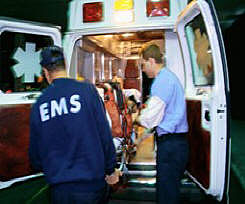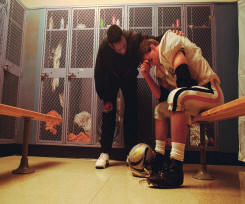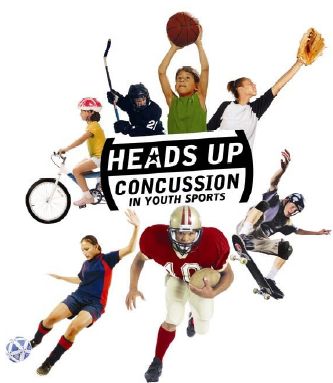|
Parents: if you think your child has suffered a concussion
Remove them from game/practice
immediately
Seek medical attention; don't try to
judge the severity of the injury
yourself
Physical and cognitive rest is key
At
home: watch
closely
Review the signs and symptoms of a
concussion, and keep in mind that some
symptoms may not appear right away...in
fact they may not be apparent for hours
or even days. Don’t try to assess the
severity of the injury yourself as
concussions can be very unpredictable.
A medical professional will be able to
decide how serious the injury is and how to manage the return-to-play decision.
Make sure your child is evaluated by someone who
is experienced in the diagnosis and management
of concussions- it's important to inquire.
Take the
Acute Concussion Evaluation (ACE)
Physician Form (developed by our own
Dr. Gerard Gioia and his colleague Dr. Mickey
Collins) with you to the
doctor to ensure a thorough evaluation.
Signs reported by
observers
Symptoms reported by athlete
- Appears dazed or
stunned
- Is confused about assignment or
position
- Forgets an instruction
- Is unsure of game, score, or
opponent
- Moves clumsily
- Answers questions slowly
- Loses consciousness (even briefly)
- Shows mood, behavior, or personality
changes
- Can’t recall events prior to hit or
fall
-
Can’t recall events after hit or
fall
|
- Headache or “pressure” in head
- Nausea or vomiting
- Balance problems or dizziness
- Double or blurry vision
- Sensitivity to light
- Sensitivity to noise
- Feeling sluggish, hazy, foggy, or
groggy
- Concentration or memory problems
- Confusion
- Does not “feel right” or is “feeling
down”
|
| |
|
|
|
|
 Call for emergency help if...
Call for emergency help if...
Most
concussions do not result in emergency
care. However, if symptoms worsen,
you notice behavioral changes or
any
of the following, seek care urgently:
-
headaches that worsen
-
seizures
-
neck pain
-
very drowsy,
can't be awakened
-
repeated vomiting
-
increasing confusion or irritability
-
weakness, numbness in arms and legs
-
unable to recognize people/places,
less responsive than usual
If you observe any
of the above signs, call your doctor or
go to the emergency room immediately
Source:
ACE Post-Concussion Home/School
Instructions Children's
National Medical Center, Washington
DC
|
|
|
|
|
 Keep them out of play... Keep them out of play...
Until their brain has fully healed
Knowing when a concussion, or brain
injury, has fully healed is difficult.
The return-to-play decision is a medical
decision, period.
A coach, parent, or any other
well-meaning person typically does not
have the skill and/or experience
required to decide when the athlete's
brain has healed. While the
majority of concussions do heal within a
few weeks, it's important to know that
re-injuring
a brain before a previous injury has
completely resolved can have
catastrophic consequences. A rare
complication called
second impact
syndrome can be fatal. At best,
multiple concussions within a short
period of time can lead to a prolonged
recovery of weeks, months, or years.
The return-to-play decision is one of
the most critical decisions your health
care provider will make.
|
|
|
 The CDC's "Heads Up" campaign The CDC's "Heads Up" campaign
has downloadable
materials for:
parents
athletes
coaches
schools
|
For further information visit:
www.cdc.gov/ConcussionInYouthSports
|
|
|
|
|

SportsConcussions.org does not provide medical advice, diagnosis or
treatment. Additional
Information
| Phone: |
360-775-8197 |
| Editor: Jean Rickerson: |
|
Main Email:
Alaska office: |
|
| Connecticut Office: |
|
Rhode Island Office:
Virginia office: |
|
| Facebook: |
|
| More: |
Contact Information |




